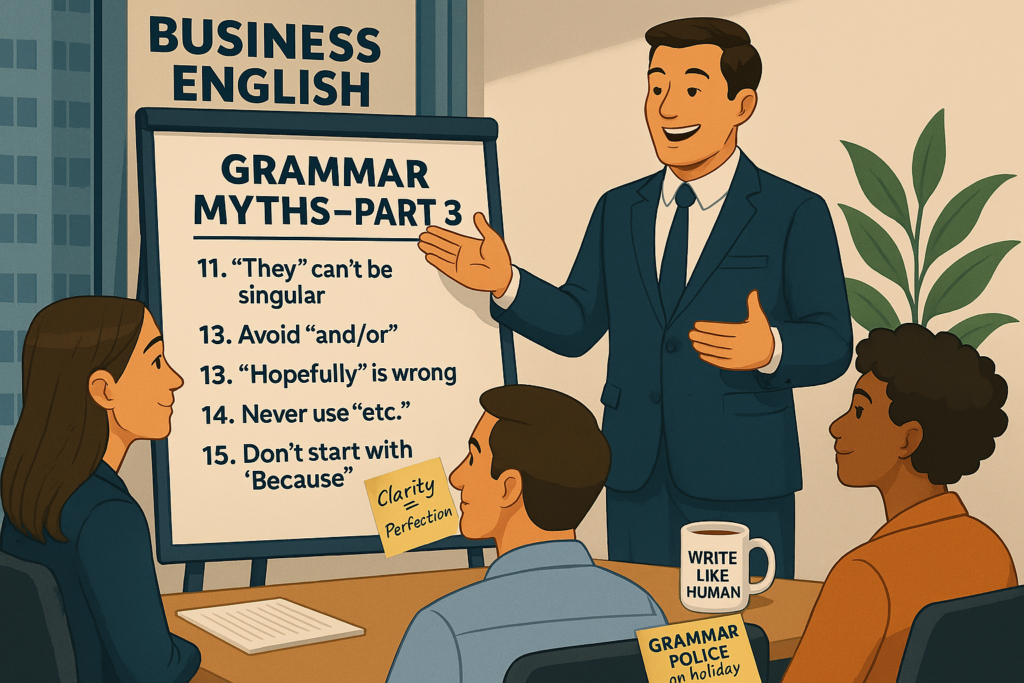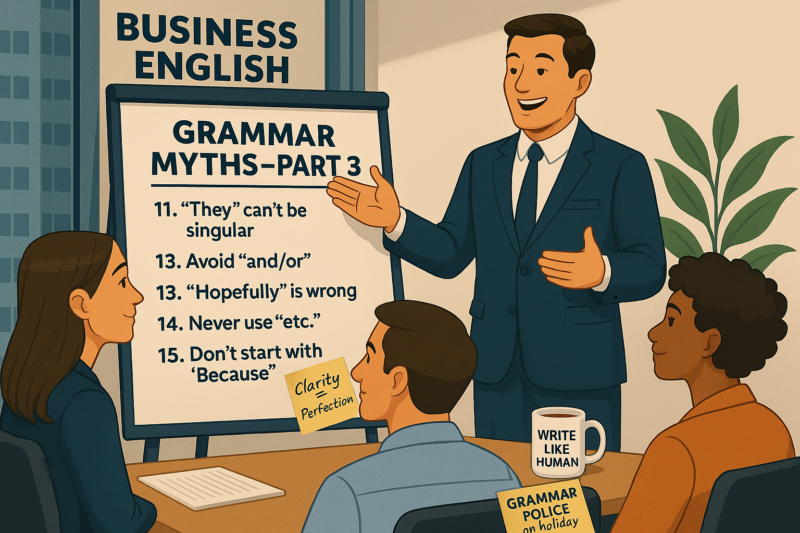
By now, you’ve probably realised that many of the “rules” we were taught about English aren’t rules at all. They’re myths—often outdated, sometimes misunderstood, and occasionally just made up.
In this final part of the series, we’re tackling a few more that still trip people up in business writing.
Myth 11: You must never use “they” as a singular pronoun
The myth: They is plural, so using it for one person is incorrect.
The truth: They has been used as a singular pronoun for centuries—and it’s now widely accepted, especially when gender is unknown or irrelevant.
✅ If a client calls, ask them to leave a message.
✅ Each participant should bring their own laptop.
Grammar tip: Singular they is grammatically correct, inclusive, and often the clearest option.
Myth 12: You must never use “and/or”
The myth: And/or is clumsy, confusing, or incorrect.
The truth: While it can be overused, and/or is perfectly valid when you need to express both options clearly.
✅ Please bring your laptop and/or tablet to the session.
✅ The role may involve travel and/or weekend work.
Grammar tip: Use and/or when both options are possible, and you want to avoid ambiguity. Just don’t overdo it—clarity is still key.
Myth 13: “Hopefully” is incorrect at the start of a sentence
The myth: Hopefully can only mean “in a hopeful manner.”
The truth: Language evolves. Hopefully is now widely accepted to mean “I hope” or “it is hoped.”
✅ Hopefully, the new system will be easier to use.
✅ Hopefully, we’ll see results by next quarter.
Grammar tip: This is called a sentence adverb—it modifies the whole sentence, not just one word. And yes, it’s allowed.
Myth 14: You should never use “etc.” in business writing
The myth: Etc. is vague, lazy, or unprofessional.
The truth: Etc. is perfectly acceptable when the context is clear and the list is obvious.
✅ We’ll need pens, notebooks, flipcharts, etc.
✅ The team handles logistics, scheduling, travel, etc.
Grammar tip: Don’t overuse it—but don’t fear it either. Just make sure your reader knows what kind of things you’re leaving out.
Myth 15: You must never begin a sentence with “Because”
The myth: Starting with because creates a sentence fragment.
The truth: It’s only a fragment if you don’t finish the thought.
✅ Because the deadline moved, we had to adjust the timeline.
❌ Because the deadline moved. (This one is a fragment.)
Grammar tip: Because is a subordinating conjunction. It’s fine at the start—as long as the sentence is complete.
So what’s the takeaway? (All three parts in one breath)
You can start with And, end with a preposition, split an infinitive, use me instead of I, repeat words, write fragments, embrace they for one person, and say hopefully without fear.
You can even use etc., and/or, and because at the start of a sentence—without the grammar police knocking on your inbox.
In short: write like a human. A clear, confident, professional human.
And yes—full disclosure—I used to be one of those grammar sticklers. The kind who’d twitch at a split infinitive or silently judge a dangling preposition. But over time, I’ve come to appreciate that modern Business English isn’t about perfection—it’s about connection. And clarity. And sounding like someone people actually want to read.
Thanks for sticking with me through all three parts of this series. If you’ve found it helpful—or if you’ve got a favourite grammar myth of your own—I’d love to hear it.
Thanks for reading,
Stuart


